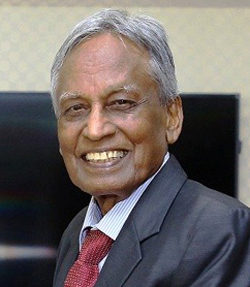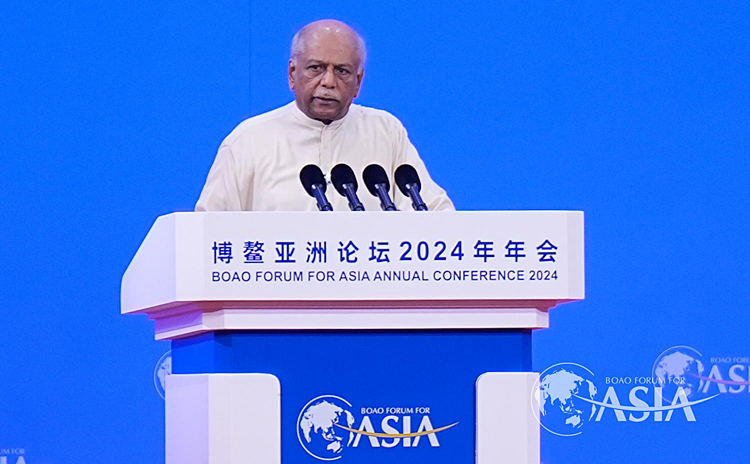INDIAN ARMED FORCES CHIEFS ON OUR RELENTLESS AND FOCUSED PUBLISHING EFFORTS

The insightful articles, inspiring narrations and analytical perspectives presented by the Editorial Team, establish an alluring connect with the reader. My compliments and best wishes to SP Guide Publications.

"Over the past 60 years, the growth of SP Guide Publications has mirrored the rising stature of Indian Navy. Its well-researched and informative magazines on Defence and Aerospace sector have served to shape an educated opinion of our military personnel, policy makers and the public alike. I wish SP's Publication team continued success, fair winds and following seas in all future endeavour!"

Since, its inception in 1964, SP Guide Publications has consistently demonstrated commitment to high-quality journalism in the aerospace and defence sectors, earning a well-deserved reputation as Asia's largest media house in this domain. I wish SP Guide Publications continued success in its pursuit of excellence.
China Clenches Colombo
Charting the complex interplay between India, Sri Lanka, and China in the Indo-Pacific
 |
The Author is Former Director General of Information Systems and A Special Forces Veteran, Indian Army |

Two recent incidents have brought the India-Sri Lanka-China relationship into focus. One is the recent visit to Beijing by the Sri Lankan Prime Minister coupled with a Chinese military delegation visiting Nepal, Maldives and Sri Lanka. The second was the raging controversy in the media that India had ceded the island of Katchatheevu to Sri Lanka in 1974, also forfeiting the fishing rights of Indian fishermen.
China has been a continuing source of military equipment to Sri Lanka, and is helping to modernise and expand the Sri Lanka Armed Forces

Former Sri Lankan Envoy to India
The Katchatheevu controversy was needless given the fact that the Ministry of External Affairs (MEA) on January 27, 2015, had replied in response to a Right to Information (RTI) query, saying, "This (1974 Agreement) did not involve either acquiring or ceding of territory belonging to India since the area in question had never been demarcated. Under the Agreement, the island of Katchatheevu lies on the Sri Lankan side of the India-Sri Lanka International Boundary Line." Notably, the foreign secretary then was S. Jaishankar, who now is the External Affairs Minister (EAM).
Austin Fernando, former Sri Lankan envoy to India, has rebuffed Jaishankar's call for talks with Sri Lanka on Katchatheevu, blaming the Indian Government for exploiting the Katchatheevu island issue as a vote-puller. In an interview with Indian media, Fernando said if India crosses the Sri Lankan maritime international boundary line, it would violate Sri Lanka's sovereignty. He also questioned, if Pakistan proposes similar sea encroachment near Goa or Bangladesh does something like this in the Bay of Bengal, what will be India's response?

China has been a significant provider of foreign aid to Sri Lanka for infrastructure funding since the end of the Sri Lankan civil war in 2009. In recent years Sri Lanka has moved closer to China, especially in terms of naval agreements. India has signed a nuclear energy pact with Sri Lanka in 2015 and will continue to provide support to Sri Lanka across all domains. China's foreign ministry recently said that China is willing to "continue supporting its financial institutions to actively negotiate with Sri Lanka, maintain friendly communication with other creditors, play a positive role in the International Monetary Fund, assist Sri Lanka in financial relief."
The Sri Lankan economy recorded a 4.5 per cent growth in the fourth quarter of 2023, following six consecutive negative quarters
Sri Lankan Prime Minister Dinesh Gunawardena recently met his counterpart and Chinese President Xi Jinping in Beijing, and said that China has pledged to develop the island nation's strategic deep sea port and the capital's airport. Speaking at the Boao Forum for Asia (BFA) Annual Conference 2024, Gunawardena said that Sri Lanka's port development has taken a new turn of "advanced" development with the assistance of China and it will "change the present scenario". The BFA is an international organisation of 29 member states, including Sri Lanka that are part of the Belt and Road Initiative (BRI) countries such as Sri Lanka.

Gunawardena further said, "Colombo port will become a hub of a newly developed port with financial instruments that could cater to the new demands that are growing among ourselves, among our countries, for development and investment, which is essential. This will change the present scenario from East Asia to East Africa, and the blue seas that we all could work together for the future that we face in a successful and great joint programs are what we look forward to."
China has been a continuing source of military equipment to Sri Lanka, and is helping to modernise and expand the Sri Lanka Armed Forces. Chinese-supplied weapons were instrumental in the defeat of the Liberation Tigers of Tamil Elam (LTTE) in 2008. When the US ended military aid in 2007 over Sri Lanka's human-rights concerns, China provided Sri Lanka $1 billion to become the island's biggest donor, giving tens of millions of dollars' worth of military equipment. Between 2004 and 2014 China reportedly provided $7 billion in loans and investment to Sri Lanka, including loans for the construction of a port in Hambantota, which now is on lease to China for 99 years.
China's foreign policy, laced with high-voltage information warfare and coercion, snares the unsuspecting victim like a python
The China National Aero Technology Import-Export Corporation is helping the Sri Lanka government in constructing an Aircraft Maintenance Center. In October 2016, the Chinese government announced it would offer military aid to Sri Lanka to help them purchase Chinese made military equipment. The China National Aero-Technology Import & Export Corporation (CATIC) has helped the Sri Lanka Air Force (SLAF) set up the Aircraft Overhaul Wing and provided Chinese specialists who assisted and guided the SLAF.
There is a view that under Gotabaya Rajapaksa, Sri Lanka attempted to establish common ground with New Delhi. However, owing to domestic convulsions these efforts have not always bore fruit, which reinforced narratives of the country shifting to China. Yet as its closest geographic and geopolitical partner, India remained a priority for Sri Lanka, regardless of who is in power and who is drafting foreign policy.

This dilemma appears to continue till date. The Sri Lankan economy recorded a 4.5 per cent growth in the fourth quarter of 2023, following six consecutive negative quarters. In March 2023, the International Monetary Fund (IMF) loaned $3 billion to Sri Lanka as part of a 48-month debt relief programme.
The new factor is China's overbearing focus and aggressive designs in the region, having already drawn Maldives further in its strategic sphere. China's foreign policy, laced with high-voltage information warfare and coercion, snares the unsuspecting victim like a python. After the Indian protests over China's research vessels in the Indian Ocean, Sri Lanka has indicated that Chinese vessels can dock at Sri Lankan ports for replenishment and repairs. This implies Chinese spy vessels can continue their mission when coming to Sri Lanka and their movement beyond.
Chinese nuclear submarines and warships do not dock at berths of Sri Lanka Port Authority (SLPA) in Colombo mandated to accommodate military vessels but instead at the Colombo South Container Terminal (CSCT)
A PLA delegation recently visited Nepal, Maldives and Sri Lanka to consolidate military ties with these countries, Both Sri Lanka and Maldives are part of China's Belt and Road Initiative (BRI). In addition to Hambantota, the Colombo South Container Terminal (CSCT), a deep-water facility built, controlled and run by the China through an aid project; is a "Chinese enclave" within a Sri Lankan administered harbor. Chinese nuclear submarines and warships do not dock at berths of Sri Lanka Port Authority (SLPA) in Colombo mandated to accommodate military vessels but instead at the CSCT.
In Maldives, China will likely establish a port under the pretext of trans-shipment and repair facilities, with the presence of Chinese nationals in the next 3-4 years. The PLA already has a presence in Coco Islands, north of Andaman and Nicobar Group of Islands. It would not be surprising if China is planning a similar presence in the Katchatheevu island of Sri Lanka under whatever pretext. This may look absurd at first glance but if US Special Forces can be in Taiwan's Kinmen Island (just 4.8 nm from China's coastal city of Xiamen) what stops China from planning PLA presence in Katchatheevu?





